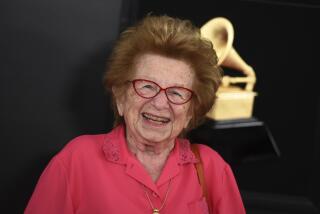Dr. Ruth Stays Down to Earth at Temple : Sex therapist gives advice on marriage and teen sex in a Newport Beach talk. But she doesn’t forget humor.
NEWPORT BEACH — Dr. Ruth Westheimer might be the only person in the universe with the chutzpah to stand next to a rabbi in a synagogue in front of 500 people and tell jokes about sex.
The nation’s best-known and most outspoken sex therapist was expected to be uncharacteristically circumspect when she appeared at Temple Bat Yahm in Newport Beach Sunday night to discuss love and relationships. And she did exercise restraint. But she seemed to have a tough time steering away from her favorite subject.
She had surprisingly little to say to her Jewish audience about how she--Karola Ruth Siegel--was sent from her birthplace in Germany to the safety of an orphanage in Switzerland at the age of 10, during the onset of the Holocaust, and never again saw her parents. Or how she went to Israel at age 16 and fought for the country’s independence as a soldier in the Jewish underground army. (“For some strange reason, I was a very good sniper.”)
In her autobiography, “All in a Lifetime,” Dr. Ruth points out that she has reacted to tragedy by developing “a dogged determination to look on the bright side of any situation.”
She seemed to be doing that Sunday night when she sized up her audience and decided she could get away with a bit of sexual humor even in a religious setting.
With her own Orthodox Jewish upbringing in mind, Dr. Ruth reassured her hosts and her audience that she would not use explicit language in the sanctuary. And after she was introduced by Rabbi Mark Miller--a tall, bearded man whose formidable presence provided a perfect foil for the 4-foot, 7-inch sex therapist--she looked up at him and said with grandmotherly charm, “Relax, don’t worry . . . .”
Then, as she stood on a “Bar Mitzvah box” so she could be seen, she told a story about a boy who was found hiding under a rabbi’s bed on the eve of the Sabbath, when, under Jewish law, marital sex is considered a mitzvah, or good deed. The rabbi, who had been acting in accordance with the Torah but sensed that something “was not quite kosher,” leaped out of bed, discovered the boy and demanded an explanation.
“Rabbi,” the earnest young student said, “what you are doing is Torah, and I must learn from you.”
That’s about as risque as it got during Dr. Ruth’s appearance as keynote speaker at an event co-sponsored by Temple Bat Yahm’s Norman Schiff Scholar Series and the American Friends of the Hebrew University Academic Forum.
Throughout the evening, which included an informal question-answer session during a post-event reception at the Center Club in Costa Mesa, 64-year-old Dr. Ruth managed to stick to relationship issues that she could discuss without getting clinical.
The author of a number of books on sexuality, including “First Love: a Young People’s Guide to Sexual Information,” Dr. Ruth said she firmly believes in making contraceptives available to young people to prevent AIDS as well as teen pregnancy.
“With some teens, talking about abstinence is useless,” said the former member of Planned Parenthood’s New York staff. “And scare tactics don’t work because the libido is so strong.”
Parents need to concentrate on educating their children, encouraging them not to succumb to peer pressure if they choose abstinence and letting them know they have an obligation to protect themselves if they do become sexually active, Dr. Ruth said.
She sympathized with parents who find it difficult to talk to their children about sex. In her pre-Dr. Ruth days, when her two children were growing up, “I was as uptight as anybody else about talking about these kinds of things,” she admitted.
Once she learned to be candid and began educating others, she developed a teaching style that is particularly effective with young people and reflects one of her favorite maxims: “A lesson taught with humor is a lesson retained.”
Turning her attention to adult relationships, Dr. Ruth said high expectations are often to blame when marriages fail.
“If people enter into a relationship with expectations that are almost impossible to fulfill--with two people trying to be everything to each other--that leads to a tremendous amount of disappointment,” she said.
Dr. Ruth, who went through two divorces as a young woman but has been married to Fred Westheimer for 31 years, said she sees increasing stability in the institution of marriage because couples are talking more openly about their problems.
People with troubled marriages need to acknowledge the stresses and anxieties that are endemic to modern life, she said, adding, “We need to keep those worries outside of the bedroom.”
For couples who have problems but basically have a “workable relationship,” professional help can make a big difference, she said. However, she added, there are limits to what media therapists can do.
“I can’t do therapy on the air. All I do is educate,” she said. “Sometimes, with common sense and humor, I might help somebody. At least I give people the idea that they aren’t the only ones having problems. And I can say, ‘Don’t just sit there and suffer. Do something about it.’ ”
Dr. Ruth--who became a celebrity almost overnight after her syndicated radio call-in show, “Sexually Speaking,” was launched in 1980--said there’s a growing demand for help from media therapists because, in tough economic times, more people are unable to afford private counseling.
Loneliness, exacerbated by the loss of the extended family, also keeps media therapists in business, observed Dr. Ruth, who earned her doctorate of education in the interdisciplinary study of the family at Columbia University and still maintains a private psychosexual therapy practice in New York.
“I believe strongly that we in this country are making a big mistake about grandparents,” she said. “They have to be taught not to meddle, that is true. However, what we are doing is like what the Eskimos did. When people weren’t gainfully employed anymore, they put them on a piece of ice, gave them some bread and pushed them out to sea. We ship grandparents to Florida and segregate them in retirement communities instead of asking them to be useful, to do something constructive with the next generation.”
Dr. Ruth said she plans to go to Russia to make a documentary demonstrating that, in extended families, it’s the grandmothers who pass on religious values to children.
She’d like to see more of that happening in America, where, as Miller observed at the start of the Sunday night program, many people have “lost their moral compass.”
“Much of family life is trivialized and fragmented,” he said. “So many are rootless and alienated. We’ve given our children so much of what they need to live with, but can we give them what they need to live for?”
Dr. Ruth’s answer to that is “yes”--if parents are willing to invest more in their children. “Parents need to give their time. It has nothing to do with money,” she said in a telephone interview from New York shortly before coming to Newport Beach.
The upsurge in violence among young people can be attributed at least partly to the fact that busy parents are too far removed from their children’s day-to-day lives, Dr. Ruth contended. She said, for example, that parents should be monitoring and restricting what their children watch on television because “the amount of violence our young people see on TV is unacceptable.”
She’s also concerned about parents who “throw up their hands in despair” and retreat when their children reach the volatile teen years. “We cannot tolerate that. We can’t afford to,” she said.
Dr. Ruth, who recently co-authored a book with Steven Kaplanon about how Ethiopian Jews have adjusted to life in Israel, said she was impressed by the fact that they left their native country with no possessions but brought something far more important to the Jewish homeland--close-knit families with a strong sense of values.
She believes it’s critical for parents to impart values to their children at an early age. For her master’s thesis, Dr. Ruth conducted a study of 100 people who had become orphans during World War II. She discovered that, like her, most of them married young--because having a family was crucial to re-creating what was lost--and eventually became successful in their careers. There were no delinquents or criminals among them.
In her autobiography, she wrote: “When you considered what difficult, parentless lives we had . . . this adjustment may come as something of a surprise. What explains it, I think, is the crucial importance of early upbringing: We had all come from good, solid, middle-class German Jewish homes, and the values and love we had gotten there transcended the unhappiness and loneliness we suffered . . . .”
Dr. Ruth recalled that, before the Holocaust separated her from her parents, she was a spoiled only child who went to the synagogue every Friday night with her father and was encouraged to study. She remembers lighting the Sabbath candles with her mother and observing all the Jewish holidays. Mostly, she remembers a lot of caring.
For a long time after she learned that her parents and grandmother had been sent to Auschwitz, she felt guilty that she hadn’t remained with them in Germany. But now she is awe-struck by the sacrifice they made in order to save her.
“I don’t know if I would have ever had the strength to place my child on a train without knowing if I would ever see him again,” she told her audience at Temple Bat Yahm.
She does know that when her mother put her on the train to Switzerland, she already had been given the foundation she would need to cope with tragedy and loss and become what she is today: a spunky celebrity educator who can make sex a safe subject almost anywhere--even in a synagogue.
More to Read
Sign up for Essential California
The most important California stories and recommendations in your inbox every morning.
You may occasionally receive promotional content from the Los Angeles Times.










